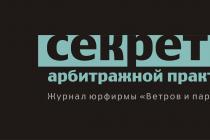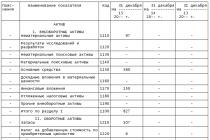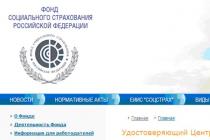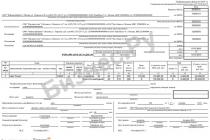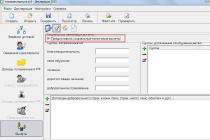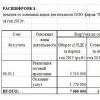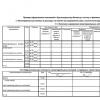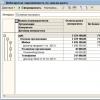Good day, dear readers of the site site!
We continue the topic of professional standards.
For those who have not yet read the previous articles on this topic, by tradition I give a link to them:
By order of the Ministry of Labor dated 06.10.2015 No. 691n, the professional standard of a personnel management specialist was approved, which many personnel officers were looking forward to.
Human Resources Specialist Standard- unified in the field of personnel management, includes both personnel records management and recruitment and applies to all specialists in the field of personnel management, including heads of personnel departments.
At present, this standard is not mandatory.
Since July 2016, amendments to the Labor Code of the Russian Federation come into force, according to which professional standards become mandatory if the Labor Code of the Russian Federation, other federal laws, other regulatory legal acts of the Russian Federation establish requirements for the qualifications necessary for an employee to perform a certain labor function.
Those. if any federal law or regulatory legal act of the Russian Federation appears that establishes requirements for the qualification of a personnel specialist, then the professional standard in this part will be mandatory for all legal entities and individual entrepreneurs. But this is unlikely.
In the absence of such laws and regulations, professional standards are applied by employers as a basis for determining qualification requirements, taking into account the specifics of the activities of each organization.
As for the state non-budgetary funds of the Russian Federation, state or municipal institutions, unitary enterprises, as well as state corporations, companies and business entities, more than 50 percent of the shares (stakes) in the authorized capital of which are state or municipal property, the peculiarity of the application of professional standards in them established by the Government of the Russian Federation. On June 27, 2016, the Government of the Russian Federation adopted Decree No. 584, which establishes precisely these features. You can read more about this in September 2016.
General information
The professional standard for a HR specialist divides all the work of personnel officers into 8 generalized labor functions, namely:
- (A) Documentation of work with personnel.
- (B) Staffing activities.
- (C) Activities for the evaluation and certification of personnel.
- (D) Personnel development activities.
- (E) Activities for the organization of labor and remuneration of personnel.
- (F) Organizing corporate social policy activities.
- (G) Operational management of the personnel and division of the organization.
- (H) Strategic personnel management of the organization.
For each generalized labor function, the standard provides:
- skill levels;
- possible job titles;
- education and training requirements;
- practical work experience requirements;
- the necessary knowledge and skills.
Each generalized labor function, in turn, includes certain labor functions, which are also subdivided into specific labor activities worker. We will consider them a little later, while we decide on the qualifications and job titles in the professional standard of the personnel officer.
HR qualification levels
In the professional standard of a “personnel management specialist”, only 3 skill levels are defined, these are 5, 6, and 7, and there are a total of nine of them. They are approved by order of the Ministry of Labor and Social Protection of the Russian Federation dated April 12, 2013 No. 148n specifically for the development of draft professional standards and establish uniform requirements for the qualifications of employees (powers and responsibilities, the nature of skills, knowledge, education and experience), which can be clarified and expanded in a specific professional standard, depending on the type of professional activity.
Fifth skill level involves independent work on solving practical problems that require an independent analysis of the situation, methods of solution. In the professional standard of the personnel officer, the fifth level of qualification refers to the first generalized t / f (work with documents).
Sixth skill level- independent activity to determine the tasks of their own work and (or) subordinates to achieve a specific goal. The specified level refers to the generalized t / f from 02 (B) to 06 (F) and affects the work of, for example, a personnel manager, a recruitment specialist, a development and training specialist, compensation and benefits.
Seventh skill level refers to the last two generalized labor functions (7 (G), 8 (H)) and involves the definition of a strategy, management of processes and activities, including innovation, with decision-making at the level of large organizations or departments. The seventh level of qualification concerns the heads (heads) of the personnel department, directors of personnel.
Possible job titles in the professional standard
They are given for each generalized labor function, and, according to Decree of the Government of the Russian Federation of January 22, 2013 No. 23, the Ministry of Labor of the Russian Federation also establishes the identity of the names of positions (professions, specialties) in qualification reference books, the names of positions (professions, specialties) contained in professional standards.

In its unpublished recommendations, the Ministry of Labor of the Russian Federation recommends that the position be named in accordance with one generalized labor function(within the framework of one professional standard), taking into account the specifics of work for a particular employer and Part 2 of Art. 57 of the Labor Code of the Russian Federation (“preferential” positions, restrictions).
If the employee performs work in different positions (professions), i.e. various generalized labor functions, then the name of the position (profession, specialty) is established according to the work performed at a higher level of qualification. For example, an employee works with documents and searches for personnel, therefore, his position can be called a personnel specialist.
Because the position of a personnel worker is clearly not classified as preferential, then it is not required to rename it, in case of discrepancies with the name from the professional standard. But no one forbids doing this in the manner prescribed by the labor legislation of the Russian Federation.
Professional standard in a budgetary organization
As for budgetary institutions. Taking into account the tariff systems of remuneration in such institutions, a unified approach to determining the wages of employees of budgetary organizations, including in accordance with the recommendations of the Russian Tripartite Commission, a personnel employee has always been named according to qualification directories, despite the fact that this position has never been preferential , and the directories themselves have always been recommended. You will never meet any HR specialist there.
Now, with the introduction of professional standards, a situation may arise when an institution is asked to rename the position of a personnel specialist, for example, to the position of a personnel specialist, despite the fact that the TSA is still in effect. The main thing is not to forget that all personnel procedures must comply with the provisions of labor legislation (Article 72, Article 74 of the Labor Code of the Russian Federation), otherwise they like to go too far with us.
Labor functions, labor actions
As I already wrote, in the professional standard of a personnel management specialist there are 8 generalized labor functions. Each of these generalized t / f is divided into labor functions (within the generalized), which in turn include specific labor actions of the employee.
Professional standard of personnel officer
total of 8 generalized labor functions (1 is shown in the image)

According to the recommendations of the Ministry of Labor of the Russian Federation, the duties of an employee (note the site: in the employment contract itself or in the job description) should indicate labor functions and (or) labor actions , which the employee must perform within the framework of his position, taking into account the tasks and functions of the structural unit.
In addition to the cases provided for by federal laws, taking into account the Labor Code of the Russian Federation, the specifics of the activity, the employer may also:
- distribute labor activities between several positions (professions, specialties), independently determining the content and volume of work performed by the employee;
- expand the list of labor activities for individual positions (professions, specialties) in comparison with the list from the professional standard. Interestingly, if the draft recommendations of 2014 did not specify whether it is possible to invent new labor activities from oneself, then in the unpublished draft on the features of the use of PS for the public sector, it has already been noted that it is possible to expand labor activities only at the expense of labor functions and labor activities from other generalized t / f of one professional standard or from related PS.
It is worth emphasizing again that in accordance with labor legislation, it is impossible to change the labor function of an employee without his consent.
Changing the terms of the employment contract determined by the parties, including changing the labor function of the employee, is possible by agreement of the parties (Article 72 of the Labor Code of the Russian Federation).
With the exception of the employee’s labor function, the terms of the employment contract can also be changed at the initiative of the employer (with a notice to the employee 2 months in advance), for reasons related to changes in the organizational and technological working conditions, and when it is impossible to maintain the previous terms of the employment contract.
Based on early judicial practice, it is not a change in the labor function of an employee - the specification of his duties in the job description within the limits of the duties specified in the qualification handbooks, and the courts do not pay attention to the fact that these handbooks are recommended. What will be the judicial practice in connection with the entry into force of professional standards, provided they are optional, time will tell.
Qualification Requirements
From July 2016, qualification requirements in the professional standard for a HR specialist will be mandatory if any federal law or regulation establishing these requirements appears. In other cases, the professional standard is used by employers as the basis for determining the specified qualification requirements, taking into account the characteristics of the work of employees, the technologies used and the adopted organization of production and labor.
education and training,
practical work experience

Interestingly. To work with documents (generalized labor function: documentary support for work with personnel (A)) requires secondary vocational education (according to the training program for mid-level specialists), not counting additional, but for all the other 7 generalized functions, only higher education, also with additional education. Moreover, for some labor functions, the levels of higher education are specified directly, for example, for the search and evaluation of personnel, you can get by with a bachelor's degree, but the heads of the personnel department (generalized labor functions: operational (G) and strategic (H) management) must already have a higher education specialist or graduate level.
As for practical experience. According to the specified standard, work experience (at least 5 years) is required only for two generalized labor functions: operational management of personnel and organizational unit (G), strategic personnel management of the organization (H). For all other personnel work, the specified standard does not establish requirements for work experience.
Please note that in the professional standard of a personnel management specialist, secondary or higher professional education is indicated without reference to its type (specialty, direction), there are also no OKSO codes (classifier of specialties by education), i.e. it is assumed that the personnel officer can have any education.
Although, it is still worth noting that the presence of a “profile” education is an indisputable advantage when applying for a job, the main thing is to choose a specialty that is closer to the intended personnel work (hours in labor law are required).
So today you can get an education:
- manager (personnel management);
- document specialist (document management and document management support);
- specialist in documentary support of management, archivist (documentation support of management and archiving);
- lawyer (jurisprudence), etc.
The catch is what to consider under the profile for the personnel officer? The answer to this question is purely subjective, and depends on the wishes of a particular employer. By the way, the professional standard of a personnel management specialist also does not give an answer to this question.
In the absence of specialized education, professional retraining and advanced training are additionally required.
According to the Law “On Education”, additional vocational education means advanced training (at least 16 hours) and professional retraining (at least 250 hours).
Professional development program is aimed at improving and (or) obtaining new competencies necessary for professional activities, and (or) raising the professional level in within the existing qualifications.
Professional retraining program is aimed at obtaining the competence necessary to perform a new type of professional activity, the acquisition of a new qualification.)
Thus, based on the specific position performed by the employee of the labor function, one can understand what requirements the standard imposes on a personnel specialist.
In general, judging by the vacancies, a basic specialized education is not necessary for a human resources specialist, but more often than not, additional personnel work and work experience are required. But employers most often want to see an employee with a higher specialized education (HR management) and, again, work experience as a personnel manager. This is actually the difference between the professional standard of a personnel officer and the expectations of employers. Although, in principle, there are also vacancies for personnel workers without a requirement for work experience, the main thing is to find them in time.
Required knowledge and skills
Actually, these are the knowledge and skills that a personnel officer needs to know and be able to do in order to perform their job duties.
In the professional standard of a specialist in personnel management, knowledge and skills are given for each labor function within the framework of a generalized one. Let me remind you that there are only 8 generalized t / f, but there are many times more labor functions within the framework of generalized ones, not to mention labor actions.
So, to perform the first generalized t / f: documentary support of work with personnel (for all three labor functions), knowledge is required:
- labor legislation and other acts containing labor law norms;
- legislation of the Russian Federation on personal data;
- the fundamentals of archival legislation and regulatory legal acts of the Russian Federation, in terms of maintaining documentation on personnel;
- basics of workflow and documentation support;
- organization structures;
- technologies, methods and techniques for analyzing and systematizing documents and information;
- standards of ethics and business communication.

The same is true with the skills of a HR worker. For all three t / f (within one generalized one), it is required to comply with the norms of business communication ethics, all other skills differ, although some are not so strong.

If a personnel specialist performs all the work on documentary support of work with personnel (and this usually happens), the requirements for the necessary knowledge and skills must be considered comprehensively.
Let's summarize what has been said:
1. Since July 2016 professional standard a specialist in personnel management will be mandatory, in terms of qualifications, if the Labor Code of the Russian Federation, other federal laws, other regulatory legal acts of the Russian Federation establish requirements for the qualifications of a personnel worker.
2. In the absence of such laws and regulations, the professional standard of the personnel officer is used by employers as the basis for determining qualification requirements, taking into account the characteristics of the work performed by the employee, the specifics of the organization's activities.
3. The procedure for applying professional standards in the public sector may be set separately by the Government of the Russian Federation. The specified procedure was established by Decree of the Government of the Russian Federation of June 27, 2016 No. 584.
4. The name of the position in the professional standard is mandatory, if it is provided for by federal laws, including the Labor Code of the Russian Federation (Article 57), in the case when the performance of work in a certain position (profession, specialty) is associated with the provision of compensation, benefits, restrictions. In other cases, it is recommended to name the position in accordance with one generalized labor function, but if the employee performs work according to different generalized t / f, then the name of the position is established according to the work performed at a higher level of qualification.
5. In an employment contract or job description it is recommended to indicate labor functions and (or) labor actions from the professional standard.
6. If an employer's decision to apply professional standards could lead to changing the terms of the employment contract determined by the parties, including changing the labor function of an employee, the employer should be guided by the Labor Code of the Russian Federation (Articles 72, 74) and other federal laws.


